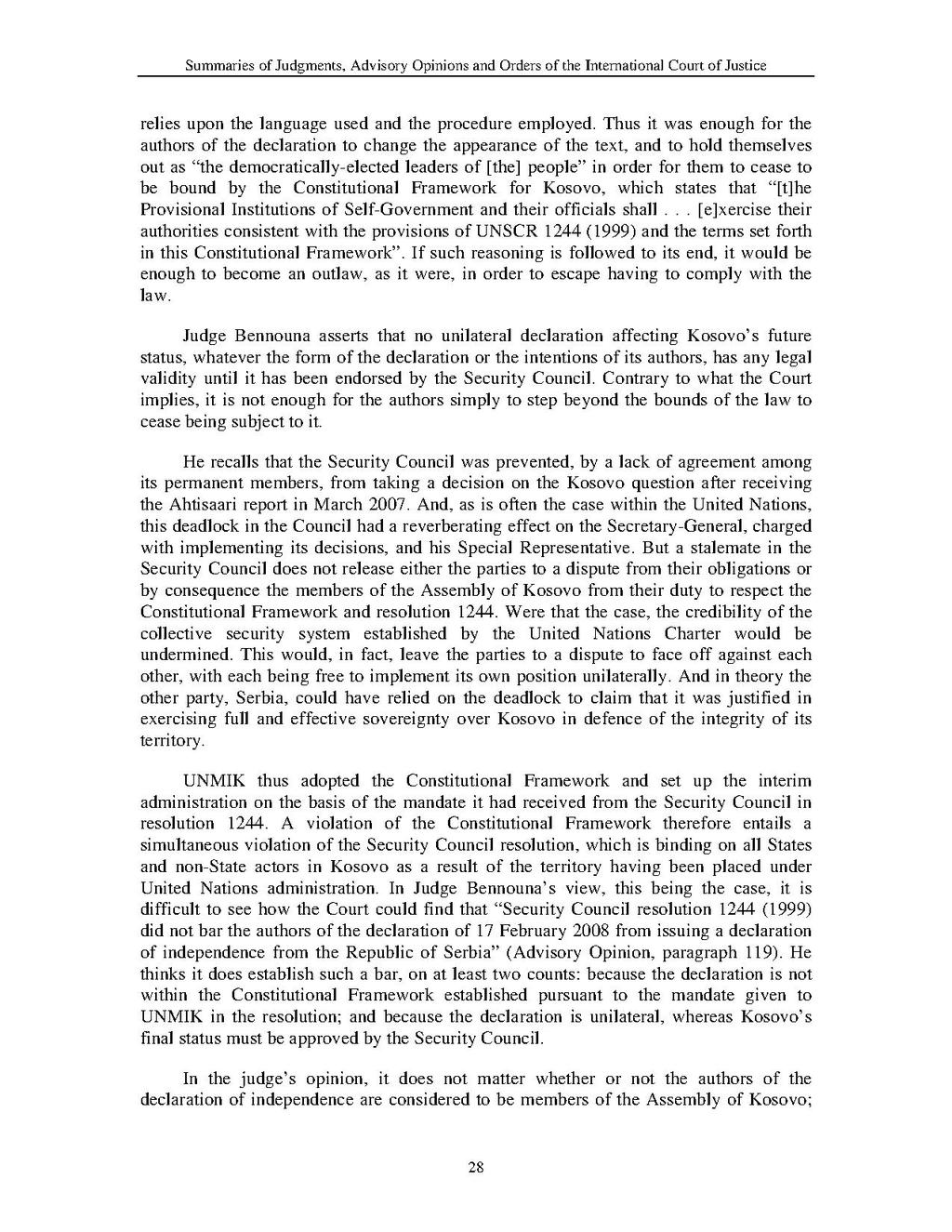Summaries of Judgments, Advisory Opinions and Orders of the International Court of Justice
relies upon the language used and the procedure employed. Thus it was enough for the authors of the declaration to change the appearance of the text, and to hold themselves out as "the democratically-elected leaders of [the] people" in order for them to cease to be bound by the Constitutional Framework for Kosovo, which states that "[t]he Provisional Institutions of Self-Government and their officials shall…[e]xercise their authorities consistent with the provisions of UNSCR 1244 (1999) and the terms set forth in this Constitutional Framework". If such reasoning is followed to its end, it would be enough to become an outlaw, as it were, in order to escape having to comply with the law.
Judge Bennouna asserts that no unilateral declaration affecting Kosovo's future status, whatever the form of the declaration or the intentions of its authors, has any legal validity until it has been endorsed by the Security Council. Contrary to what the Court implies, it is not enough for the authors simply to step beyond the bounds of the law to cease being subject to it.
He recalls that the Security Council was prevented, by a lack of agreement among its permanent members, from taking a decision on the Kosovo question after receiving the Ahtisaari report in March 2007. And, as is often the case within the United Nations, this deadlock in the Council had a reverberating effect on the Secretary-General, charged with implementing its decisions, and his Special Representative. But a stalemate in the Security Council does not release either the parties to a dispute from their obligations or by consequence the members of the Assembly of Kosovo from their duty to respect the Constitutional Framework and resolution 1244. Were that the case, the credibility of the collective security system established by the United Nations Charter would be undermined. This would, in fact, leave the parties to a dispute to face off against each other, with each being free to implement its own position unilaterally. And in theory the other party, Serbia, could have relied on the deadlock to claim that it was justified in exercising full and effective sovereignty over Kosovo in defence of the integrity of its territory.
UNMIK thus adopted the Constitutional Framework and set up the interim administration on the basis of the mandate it had received from the Security Council in resolution 1244. A violation of the Constitutional Framework therefore entails a simultaneous violation of the Security Council resolution, which is binding on all States and non-State actors in Kosovo as a result of the territory having been placed under United Nations administration. In Judge Bennouna's view, this being the case, it is difficult to see how the Court could find that "Security Council resolution 1244 (1999) did not bar the authors of the declaration of 17 February 2008 from issuing a declaration of independence from the Republic of Serbia" (Advisory Opinion, paragraph 119). He thinks it does establish such a bar, on at least two counts: because the declaration is not within the Constitutional Framework established pursuant to the mandate given to UNMIK in the resolution; and because the declaration is unilateral, whereas Kosovo's final status must be approved by the Security Council.
In the judge's opinion, it does not matter whether or not the authors of the declaration of independence are considered to be members of the Assembly of Kosovo;
28
